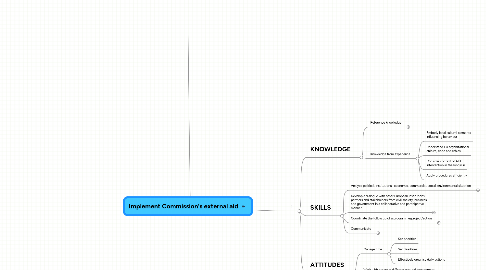
1. CONTEXT
1.1. Country
1.2. Sector
1.3. EC's approach to aid delivery
2. 1
2.1. KNOWLEDGE
2.1.1. Reference knowledge
2.1.1.1. Know basic issues on Aid Delivery Methods
2.1.1.1.1. Aid architecture (global partnership)
2.1.1.1.2. EC's approach to aid delivery
2.1.1.1.3. Aid effectiveness agenda
2.1.1.1.4. EC rules and procedures
2.1.1.2. Know basic knowledge in finance and economics
2.1.1.3. Know country specificities
2.1.1.3.1. National structures and institutions (mapping of institutional responsibilities)
2.1.1.3.2. National development policies and strategies
2.1.1.3.3. History
2.1.1.3.4. Politics
2.1.1.3.5. Macro economic context
2.1.1.3.6. Public finance management
2.1.1.4. Know sector/thematic specificities
2.1.1.4.1. Macro-economic support
2.1.1.4.2. Trade and regional integration
2.1.1.4.3. Environment and sustainable management of natural resources
2.1.1.4.4. Infrastructure, communications and transport
2.1.1.4.5. Water and energy
2.1.1.4.6. Rural development, territorial planning, agriculture and food security
2.1.1.4.7. Governance, democracy, human rights and support for economic and institutional reforms
2.1.1.4.8. Conflict prevention and fragile states
2.1.1.4.9. Human development
2.1.1.4.10. Social cohesion and employment
2.1.1.5. Know cross cutting issues
2.1.1.5.1. Democracy, Good Governance, Human rights, the rights of children and indigenous peoples
2.1.1.5.2. Gender equality
2.1.1.5.3. Environment sustainability
2.1.1.5.4. HIV/AIDS
2.1.2. Knowledge from experience
2.1.2.1. Embody local cultural elements influencing behaviour
2.1.2.2. Understand EU organizational culture, code and ethics
2.1.2.3. Consider context of AID intervention in the long run
2.1.2.4. Apply procedures efficiently
2.2. SKILLS
2.2.1. Analyse political, institutional, economic, commercial, social, environmental situation
2.2.1.1. Identify priorities of EU and partner country
2.2.1.2. Identify and select relevant indicators (for sector and/or country)
2.2.1.3. Identify evidences from implementation, publications, lessons learned, etc.
2.2.1.4. Identify problems, constraints, opportunities and synergies
2.2.1.4.1. What forms of information about the situation do you collect on a regular basis?
2.2.1.4.2. How do you use the information obtained in help you make decisions?
2.2.1.4.3. How do you change your approaches to problem in the light of the information obtained?
2.2.2. Develop a dialogue with other European institutions, partners and stakeholders from civil society, business and government in a collaborative and participative manner
2.2.2.1. Install on-going contacts between partners
2.2.2.2. Address all governance-related issues of common and mutual interest
2.2.2.3. Establish shared agendas and joint definition of priority areas of co-operation
2.2.2.4. Conduct negotiations in accordance with a given mandate
2.2.2.5. Coordinate action with national procedures and timetables
2.2.2.6. Mobilize local capacities
2.2.3. Coordinate the follow up of a programme/project/action
2.2.3.1. Program
2.2.3.2. Identify
2.2.3.3. Formulate
2.2.3.4. Finance
2.2.3.5. Implement and monitor
2.2.3.6. Evaluate
2.2.4. Communicate
2.2.4.1. Report in a transparent and accountable manner
2.2.4.2. Manage public relations
2.2.4.2.1. Represent, communicate in a professional manner with specialists in the partner country (notably the Ministry of Finance) and in international organisations (IMF, World Bank,...) in a way that enhances the reputation of the EC
2.2.4.2.2. Ensure visibility of actions
2.3. ATTITUDES
2.3.1. Manage time
2.3.1.1. Set priorities
2.3.1.2. Set deadlines
2.3.1.3. Effectively organise daily actions
2.3.2. Work with others in different cultural environment
2.3.2.1. Make effective use of external competences
2.3.2.2. Conduct a meeting
2.3.2.3. Manage a team
2.3.2.4. Manage crisis
2.3.2.4.1. Deal with "difficult" persons
2.3.2.4.2. Listen before deciding
2.3.3. Construct knowledge with colleagues, from experiences
2.3.3.1. Share knowledge with colleagues
2.3.3.1.1. What opportunities do you make to discuss aspects of your work with colleagues?
2.3.3.1.2. What opportunities do you make to receive feedback on your work from colleagues?
2.3.3.1.3. In what ways do you ensure that your more junior colleagues receive your help and support?
2.3.3.1.4. In what ways do you maintain and develop communication with your colleagues in your department/division?
2.3.3.1.5. What do you do to work with your colleagues or to encourage colleagues to become aware of the potential for learning from each other and the benefits of working in groups?
2.3.3.2. Share knowledge within EU
2.3.3.2.1. In what ways do you maintain your familiarity with national or local policy directions, monitor effects on AID delivery, and voice your concerns in appropriate forums?
2.3.3.2.2. How do you ensure that your institution is using a comprehensive approach to AID delivery for the purposes of tenure, promotion and developmental review?
2.3.3.2.3. In what ways do you contribute to decision-making processes in your institution in order to enhance AID delivery?
2.3.4. Engage in professional development
2.3.4.1. Display desire to remain up to date and further develop understanding relevant literature in the areas mentioned above
2.3.4.1.1. What strategies do you employ to reflect upon your work practices and identify areas for development?
2.3.4.1.2. How do you go about developing your skills and expertise in the field of AID delivery in general, or of your speciality in particular?
2.3.4.2. Research ideas and overtime to deepen knowledge in the areas mentioned under "knowledge" above in order to be in a better position to bring ideas to bear on the problems at hand
2.3.4.2.1. How do you stay in touch with developments in your own discipline or profession (AID delivery)?
2.3.4.2.2. How do you keep your expertise in your own field up to date?
2.3.4.2.3. Do you participate in seminars, courses, or conferences in the field of AID in general, or of your speciality in particular?
2.3.4.2.4. What reading related to the field of AID delivery in general, or of your speciality in particular?
